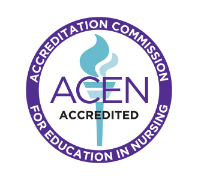Learn key nursing skills to provide full patient care including communication with doctors and administering medications. Nurses work in various settings and can advance to specialty areas.
What Is Nursing?
The Associate Degree Nursing program prepares graduates to use their skill and knowledge to fulfill the role of the nurse: enhance human flourishing, demonstrate sound nursing judgment, continually develop professional identity, and possess a spirit of inquiry to improve the quality of patient care. Encompassed within these roles are the core components of context and environment, knowledge and science, personal/professional development, quality and safety, relationship-centered care, and teamwork. These core components are introduced, developed and built upon through the curriculum. Graduates are eligible to take the National Council Licensure Examination for Registered Nurses (NCLEX-RN). The Associate Degree Nursing curriculum is organized around a clearly defined conceptual framework and combines general education and nursing courses. The nursing courses correlate classroom and clinical instruction in a variety of community agencies. Transportation to the community agencies is the responsibility of each student.


Program Shadowing or Class Tours
Getting Started
What are my degree, diploma, and certificate options?
How Do I Pay For This?
Pre-Admissions Conference
Below is a link to view the Virtual Nursing Preadmission Conference for Hazard Community and Technical College. At the end of the presentation will have the opportunity to complete the application to apply for the nursing program. You will be given the options to apply for either the ADN (RN program) or the Practical Nursing (LPN Program). If you have questions related to the information or you would like to request an in-person preadmission conference, please contact Fran Gilliam fran.gilliam@kctcs.edu 606-487-3161 or Christina Martin christy.martin@kctcs.edu 606-487-3279 for the RN program and Ashley Gay ashley.gay@kctcs.edu 606-487-3226for the PN program.
Deadline for Fall admission is April 15th
Deadline for Spring admission is October 15th
What Else Do I Need to Know?
More Information
Acceptance into the Registered Nursing program is based on a selective admission process. In order to be considered for admission, applicants must comply with the college and program admission requirements prior to April 15th for fall admission and October 15th for spring admission.
Begin by attending a Nursing Pre-admission Conference.
As a part of the application, you will need to submit the following:
- Application to Hazard Community and Technical College
- Application to the program (completed during the preadmission conference). This must be completed on an annual basis.
- Official High School Transcript (with graduation date) indicating that the applicant has or will complete a high school course of study or a passing GED official score report. Transcripts or score reports should be sent to the HCTC Admissions Office.
- Transcripts of all post-secondary education or training. To be considered an official transcript, it must be sent directly from the institution to the HCTC Admissions Office. Hand-carried transcripts and transcripts marked "Issued to student" cannot be accepted.
- Results of the National American College Test (ACT)
- Results from the Kaplan Admissions Exam
Admission Criteria
- Only the applicants meeting the following minimal admission criteria will be considered for admission to the registered nursing class:
- Kaplan Admissions Exam mean score of 70% or higher
- A cumulative GPA of 2.5
Meeting the minimum criteria does not guarantee admission.
Preference for admission is giving to applicants with the following criteria:
- Kaplan Admissions Exam mean score of 70% or higher
- Applicants who have completed 12 or more college credit hours with a cumulative GPA of 3.0 or better from any regionally accredited college.
- Kentucky residents and applicants within the HCTC service area
Though not required to be admitted into the Registered Nursing program, admitted students will need to have completed the following course prior to the start of NSG 101:
- A quantitative reasoning course adequate for an Associate in Science or Associate in Arts degree (MAT 146 or higher) with a "C" or higher
- PSY 110: General Psychology
- BIO 137: Human Anatomy and Physiology I with a grade of "C" or higher
- Proof of active status on the Medicaid Nurse Aide Registry
| Item | Approximate Cost |
|---|---|
| Tuition - per semester (Kentucky resident) $179 per credit hour (62-66 hrs) (This includes general education courses) |
$11,284 - $12,012 |
| Fees: Mandatory College Fee $8 per credit hour Resource Fee (Kaplan/Examsoft)** Liability Insurance * $11 per semester |
$ 496 - $528 |
| Nursing Books (Approximately) |
$2,060. - $2,200 |
| CPR for Health-Care Providers or Red Cross PR for the Professional Rescuer* |
$60.00 |
| Uniforms and Accessories (2 sets of scrubs, lab coat, shoes, socks, and watch) * |
$200.00 |
| Clinical Skills Pack (for entire program) |
$204.98 |
| Background Check/Drug Screen – Castle Branch |
$ 78.20 annually |
| MMR (2)* (or titre) |
$ 30.00 |
| TB Skin Test (PPD)* 2-step PPD |
$ 20.00 annually |
| Hepatitis B Series* (or titre) |
$150.00 |
| Varivax Series* (times 2 or titre) |
$140.00 - $150.00 |
| Influenza Vaccine * |
$ 25.00 |
| Covid Vaccine* |
$20.00 |
| Tdap* | $ 30.00 |
| Laptop | $300 - $800 |
| APPROXIMATE TOTAL COST OF PROGRAM | $16,342.18 -$ 17,752.18 |
(** Tuition and Fees may be subject to change.)
(*Prices may vary according to clinic/lab/vendor)
| Item | Cost |
|---|---|
| License, Licensing Exam (Application Fee, NCLEX, finger print/background check and jurisprudence exam) |
$400.00 |
| Pictures (Optional) | $ 50.00 |
| Cap, Gown, Tassel. (for graduates, Optional) | $ 50.00 |
You can earn an associate in applied science degree in two years if you maintain full-time status.
You should always choose classes in cooperation with your faculty advisor to ensure that you meet all degree requirements.

